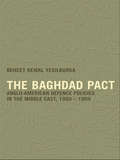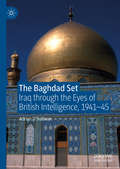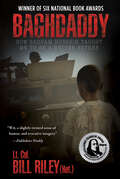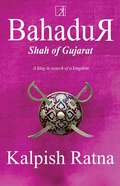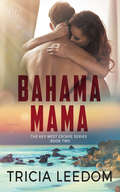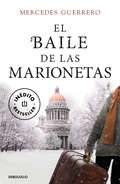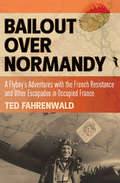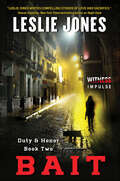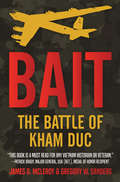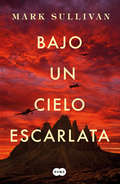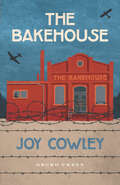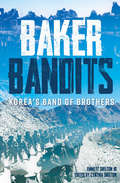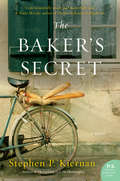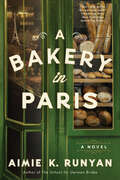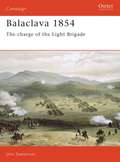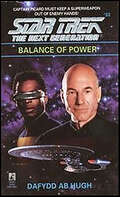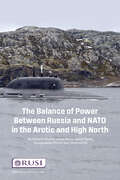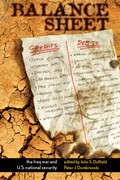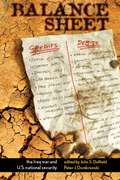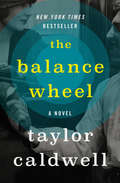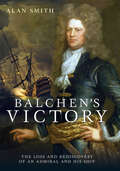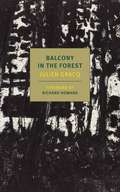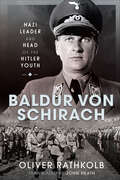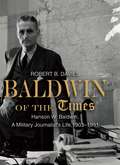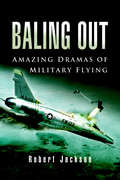- Table View
- List View
The Baghdad Pact: Anglo-American Defence Policies in the Middle East, 1950-59 (Military History and Policy #No. 18)
by Behcet Kemal YesilbursaThis book explores the formation of the Baghdad Pact and Anglo-American defence policies in the Middle East, 1950-1959. It determines the aims with which the pact was established; the failings of the pact, and the struggle that was undertaken against it by hostile countries. It examines the events surrounding the formation, development and collapse of the pact, and Anglo-American attempts to contain the Soviet Union in the Middle East. It also deals with British and American policies towards the pact and Middle Eastern defence. It seeks to examine British and American post-war defence policies in the Middle East and their collective defence projects in the region, such as the Middle East Command and Northern Tier, leading to the Baghdad Pact. It does not attempt to offer a comprehensive history of British and American policies in the Middle East, and particularly aims to explore those policies with regard to the problems of Middle East defence. In addition, it explores the policies of the local members of the pact, and examines the pact's internal structure. It poses the questions of how the members of the pact and the United States perceived the question of Middle East defence; what their basic aims were; and what problems they faced while trying to achieve these aims and implementing their chosen solutions.
The Baghdad Set: Iraq through the Eyes of British Intelligence, 1941–45
by Adrian O'SullivanThis book provides the first ever intelligence history of Iraq from 1941 to 1945, and is the third and final volume of a trilogy on regional intelligence and counterintelligence operations that includes Nazi Secret Warfare in Occupied Persia (Iran) (2014), and Espionage and Counterintelligence in Occupied Persia (Iran) (2015). This account of covert operations in Iraq during the Second World War is based on archival documents, diaries, and memoirs, interspersed with descriptions of all kinds of clandestine activity, and contextualized with analysis showing the significance of what happened regionally in terms of the greater war. After outlining the circumstances of the rise and fall of the fascist Gaylani regime, Adrian O’Sullivan examines the activities of the Allied secret services (CICI, SOE, SIS, and OSS) in Iraq, and the Axis initiatives planned or mounted against them. O'Sullivan emphasizes the social nature of human intelligence work and introduces the reader to a number of interesting, talented personalities who performed secret roles in Iraq, including the distinguished author Dame Freya Stark.
Baghdaddy: How Saddam Hussein Taught Me to Be a Better Father
by Lt. Col. Bill RileyAmerican Book Fest’s Best Book Awards Winner for Best Nonfiction Book of 2019 Military Writers Society of America Multiple Award-Winner: Founder’s Award for Standout Book of 2019 Gold Medal Award for Memoir category For readers of Educated and The Glass Castle, a moving new memoir about survival, family, and a humanizing insight into the individuals who fight the nation’s wars. As a child, he was raised in an unstable and violent home by a mother struggling with mental illness. An absent father with a firm belief in tough love left him with only his sister to understand or comfort him as they faced a home full of harshness, resentment, and physical abuse. As a man, he braved the war-torn landscapes of Kuwait, Iraq, and Saudi Arabia. Having learned early from his father that only the strong survive, he enlisted in the Air Force after high school and began an impressive military career in intelligence analysis, communications, and supporting special operations, meeting incredible individuals along the way. In his time overseas he faced harsh realities of the politics of war, the consequences of military actions, and the challenge of attempting to rebuild a country while its own people are trying to kill you. Baghdaddy is Bill Riley’s memoir: an honest and colorful depiction of his journey through a turbulent youth and into a challenging adulthood. This very human account of living in some of the least humane environments delivers the message that no matter how different we seem, we are all trying to make the best of life and learn how to be the best versions of ourselves.
Bahadur Shah of Gujarat: A King in Search of a Kingdom
by Kalpish RatnaTime has forgotten Bahadur Khan. History has condemned him as a drunken wastrel and overlooked his military genius. Part man, part horse; part Hindu, part Muslim; part Rajput, part Gujarati; what was he like, really, this rebellious young man? A warrior born, why did he refuse the most vital battle in history? Why did he surrender the islands of Bombay to two centuries of Portuguese rule? This is the story of that renegade prince, Bahadur, Shah of Gujarat. When Vasco da Gama lands near Kozhikode on 20 May 1498, he seems scant more than a visiting trader, just another discourteous barbarian, hardly a threat. But the aughts of the new century bring seismic change. Portuguese violence on the coast escalates and piracy menaces the Spice Route. Gujarat, richest among Indian kingdoms, nourished by her eighty-seven ports, feels the tremors. It is a time of shifting loyalties. Sultans wage war on land and forge uneasy entente at sea. Borders are redrawn, new kingdoms and principalities take shape. In Dilli, the throne of Hindustan is up for auction, and everybody is bidding. Alliances form and dissolve between Rajput, Lodhi, and Sharqi, while from across the mountains glares the Chagtai, Zahiruddin Babar. Into this tense arena strolls a teenager, Bahadur, Prince of Gujarat, exiled for his wildness; at nineteen, famous already for his prowess in battle. As battle lines are drawn at Panipat, veterans hold their breath. They know the fortunes of Hindustan depend on this untried youngster. In this powerfully imagined narrative, Kalpish Ratna recreates the obscure signposts of Bahadur's life drawing facts from Indian histories. The language sparkles, filigreed with lapidary skill. In various narrative styles, myth and legend blend metamagically with the tragic events of medieval history. Bahadur, masterfully delineated in chiaroscuro, reflects the confused loyalties of young Indians today. The story of this medieval prince belongs in our own times.
Bahama Mama (The Key West Escape Series #2)
by Tricia Leedom"I got a story that kept me up, turning the pages, reading on and on, shedding some tears when finally...well, ...finally...and I just couldn't put it down." - Always Time for a Nice Cup of Tea and a Good BookTroubles are piling up for Molly MacBain. Between navigating the moods of an increasingly sassy teenage daughter, grappling with money problems, and dealing with her daughter’s deadbeat dad, Molly doesn't need any more stress in her life. Her best friend’s wedding should be a welcome chance to relax, but Molly’s dismayed to discover her friend’s new brother-in-law is her idol—country music superstar Anders Ostergaard. After spending years on the country music circuit herself, Molly can't help but have a fangirl moment when she meets Anders in real life.Anders flies to Key West to attend his brother’s wedding and keep a low profile after a Vegas tragedy plasters his face to the cover of every tabloid. He has strict rules about getting involved with fans, but with her sharp wit and refreshing openness, Molly draws him in like no one has before, even as the shadow of his recent scandal stalks closer.Their flirtation is put on hold when Molly’s daughter witnesses a murder and winds up in Jamaica. Anders offers Molly his private plane, and together they race for Montego Bay, dodging the hit man who's hell-bent on eliminating everyone who knows of his crimes. When danger and proximity spark a blazing romance, Molly can't help wondering about the future. Can a fan and her idol build a lasting love? Or is their relationship just a fling fueled by the sultry Caribbean breeze? And most importantly—can she survive long enough to find out?The Key West Escape Series1. Rum Runner2. Bahama Mama – Coming May 08, 2018!3. Passion Punch – Coming 2019!“Leedom has done it again - and dare I say, even better!” – Dani, Goodreads
El baile de las marionetas
by Mercedes GuerreroUna historia de amistad, de supervivencia, de personajes entrañables, de lealtades inquebrantables, amores imposibles y traiciones imperdonables. Afganistán, 2004. La doctora Edith Lombard, de Médicos Sin Fronteras, hace guardia en un hospital de Kabul. Al atender a una joven en quirófano advierte en su cuello algo que atrae su atención: un collar del que cuelga una perla de ámbar. Una perla que Edith reconoce enseguida, pues fue robada en su casa de Quebec dieciocho años antes, en un atraco en el que su madre falleció de un disparo. Una perla de la que su padre, Édouard Lombard, había contado que perteneció a la famosa Cámara de Ámbar de San Petersburgo, desparecida durante la II Guerra Mundial. Bilbao, 1937. Del puerto de Santurce está a punto de zarpar el Habana, que llevará a más de cuatro mil niños hasta la Unión Soviética, huyendo de la guerra civil que ahogaba el país. Allí, su historia, la historia de unos exiliados utilizados como marionetas por el gobierno de Stalin, se hilvanará con la de la perla de ámbar en un viaje de setenta años que desempolvará recuerdos que nadie quería que viesen la luz.
Bailout Over Normandy: A Flyboy's Adventures with the French Resistance and Other Escapades in Occupied France
by Ted FahrenwaldA daredevil pilot in the famed 352nd Fighter Squadron, the author of this remarkable memoir bailed out of his burning Mustang two days after D-Day and was launched on a thrilling adventure on the ground in Occupied France. After months living and fighting with the French Resistance, Fahrenwald was captured by the Wehrmacht, interrogated as a spy, and interned in a POW camp--and made a daring escape just before his deportation to Germany. Nothing diminished this pilot's talent for spotting the ironic humor in even the most aggravating or dangerous situations--and nothing stopped his penchant for extracting his own improvised and sometimes hilarious version of justice. A suspenseful WWII page-turner and an outrageously witty tale of daring and friendship, this book brings to vivid life the daily bravery, mischief, and intrigues of fighter pilots, Resistance fighters, and other Allies in the air and on the ground. Captured by the Wehrmacht, however, interrogated as a spy, and interned in a POW camp, the author made a daring escape just before his deportation to Germany. Nothing diminished Ted's talent for spotting the ironic humor in even the most aggravating or dangerous situations, nor his penchant for extracting his own improvised and sometimes hilarious version of justice. The author recorded his swashbuckling adventures at age twenty-four, after his discharge and return to the States. Afterward he went into business and never again put pen to paper. But his immediate reminiscence of his wartime experience--recently found--reveals a rare literary talent.
Bait: Duty And Honor Book Two (Duty & Honor #2)
by Leslie JonesIn the next thrilling Duty & Honor novel, a female CIA agent and a Delta Force soldier must catch a deadly assassin… but do they know where the danger truly lies?After several assassination attempts on an allied royal, the CIA sends in operative Christina Madison—who bears a striking resemblance to the monarch—to pose as the famous princess and draw out her would-be killer.When Delta Force Lieutenant Gabriel Morgan's team is assigned to Christina's undercover protection detail, he's less than thrilled. Gabe wants nothing to do with a woman whose rumored screw-up nearly got her last team killed. Not to mention there's bad blood between Gabe and the CIA—he doesn't trust anyone who lies for a living.But once the trap is set and the assassin takes the bait, Gabe must protect her with his life … because danger lurks in the shadows, and now Christina is in the crosshairs.
Bait: The Battle of Kham Duc
by James D. McLeroy Gregory W. SandersA history of one of the least known and most misunderstood battles in the Vietnam War.The strategic potential of the three-day attack of two North Vietnamese Army (NVA) regiments on Kham Duc, a remote and isolated Army Special Forces camp, on the eve of the first Paris peace talks in May 1968, was so significant that former President Lyndon Johnson included it in his memoirs. This gripping, original, eyewitness narrative and thoroughly researched analysis of a widely misinterpreted battle at the height of the Vietnam War radically contradicts all the other published accounts of it. In addition to the tactical details of the combat narrative, the authors consider the grand strategies and political contexts of the U.S. and North Vietnamese leaders.Praise for Bait: The Battle of Kham Duc“This book is a must read for any Vietnam historian or veteran.” —Patrick Brady, Major General, USA (ret.), Medal of Honor Recipient“For an authentic, detailed view of how large battles between U.S. combined-arms forces and regular North Vietnamese Army forces were fought in Vietnam in 1968, Bait: The Battle of Kham Duc is required reading.” —General H. Hugh Shelton, 14th Chairman, Joint Chiefs of Staff“This first-hand, exhaustively documented account of a large battle in the Vietnam War shows the decisive role of air power in all its forms.” —Carl Schneider, Major General, USAF (ret.)“One of those rare historical narratives that explains in rich detail a battle that was little understood or reported on at the time it was fought but was of strategic importance and heroic dimension.” —Marine Corps Gazette“The account of the battle is both detailed and exceptionally well-written; McLeroy’s participation in the battle adds authenticity to the narrative.... Highly recommended for anyone interested in how large-scale battles were fought in Vietnam at the height of U.S. commitment on the ground there.” —Journal of Military History
Bajo un cielo escarlata
by Mark T. SullivanEl chico que se convirtió en espía por amor en uno de los momentos más oscuros de la historia. La novela basada en la verdadera y épica historia de un héroe olvidado de la Segunda Guerra Mundial. Pino Lella no quiere saber nada de la guerra ni de los nazis. Es un adolescente italiano obsesionado con la música y las chicas, pero, en la Milán de 1943, sus días de inocencia están contados. Cuando la casa de su familia es destruida por los bombardeos, Pino se une a una red clandestina que ayuda a los judíos a escapar a través de los Alpes, y se enamora de la bella y misteriosa Anna. Con la intención de protegerlo, sus padres lo obligan a alistarse en el ejército alemán y con solo 18 años es reclutado como chófer del general Hans Leyers, la mano derecha de Hitler en Italia y uno de los más poderosos y enigmáticos comandantes del Tercer Reich. Aunque eso le da la oportunidad de espiar para los aliados dentro del Alto Mando alemán, Pino habrá de superar los horrores de la guerra y de la ocupación nazi. Solo su amor por Anna y el sueño de la vida que compartirán algún día le darán la fuerza y el valor para seguir luchando en secreto. Los lectores que disfrutaron con La luz que no puedes ver, de Anthony Doerr, o El Ruiseñor, de Kristin Hannah, no querrán perderse esta emocionante historia de coraje, suspense y amor.
The Bakehouse
by Joy CowleyBert wants nothing more than to be old enough to fight in the war—to handle weapons, defend his country, and have a life filled with adventure. Little does he know that the secrets and danger of war don't always stay at the front line, and that one boy's actions can change everything.
Baker Bandits: Korea's Band of Brothers
by Emmett Shelton Jr.<p>An anthology of first-hand accounts of the Baker Bandits, U.S. Marines on the front line of battle during the Korean War.<p> <p>B-1-5 was a unique company in the Korean War. The Baker Bandits fought at Inchon, Naktong, Chosin Reservoir, Guerrilla Hunts and the many numbered hills. They inspired one B Company Commander, Gen. Charlie Cooper, to the extent that when he became Commanding General of the Marines First Division in 1977, his time with B-1-5 inspired his “Band Of Brothers Leadership Principles” used widely in the Corps for many years.<p> <p>Emmett Shelton was a nineteen-year-old Marine Reservist in 1950. He was called to duty after graduating Austin High School and, within six months, he was a rifleman in Korea. The Korean winter of 1950 was brutal, and Emmett was evacuated shortly after Chosin due to frostbite. After the war, Emmett got on with life, then in the 1980s he attended a Chosin Few Reunion. He was overwhelmed by a need to reconnect with his old Company, his Baker Bandits.<p> <p>Emmett tracked down B Company members one-by-one and started a newsletter, The Guidon, to share stories and reconnect. For twenty years Emmett published The Guidon, monthly. The contributing readership grew to a high of 300, including a number of young B Company Marines fighting in Afghanistan. The Baker Bandits brings together firsthand accounts from The Guidon, written by the men of B-1-5 about their time in Korea: their battles, their fallen commanders, death in the foxhole, lost platoons, injuries, and what happened to them after the war.<p>
The Baker's Secret: A Novel
by Stephen P. KiernanFrom the multiple-award-winning, critically acclaimed author of The Hummingbird and The Curiosity comes a dazzling novel of World War II—a shimmering tale of courage, determination, optimism, and the resilience of the human spirit, set in a small Normandy village on the eve of D-Day.On June 5, 1944, as dawn rises over a small town on the Normandy coast of France, Emmanuelle is making the bread that has sustained her fellow villagers in the dark days since the Germans invaded her country. Only twenty-two, Emma learned to bake at the side of a master, Ezra Kuchen, the village baker since before she was born. Apprenticed to Ezra at thirteen, Emma watched with shame and anger as her kind mentor was forced to wear the six-pointed yellow star on his clothing. She was likewise powerless to help when they pulled Ezra from his shop at gunpoint, the first of many villagers stolen away and never seen again.In the years that her sleepy coastal village has suffered under the enemy, Emma has silently, stealthily fought back. Each day, she receives an extra ration of flour to bake a dozen baguettes for the occupying troops. And each day, she mixes that precious flour with ground straw to create enough dough for two extra loaves—contraband bread she shares with the hungry villagers. Under the cold, watchful eyes of armed soldiers, she builds a clandestine network of barter and trade that she and the villagers use to thwart their occupiers. But her gift to the village is more than these few crusty loaves. Emma gives the people a taste of hope—the faith that one day the Allies will arrive to save them.
A Bakery in Paris: A Novel
by Aimie K. RunyanFrom the author of The School for German Brides, this captivating historical novel set in nineteenth-century and post–World War II Paris follows two fierce women of the same family, generations apart, who find that their futures lie in the four walls of a simple bakery in a tiny corner of Montmartre. 1870: The Prussians are at the city gates, intent to starve Paris into submission. Lisette Vigneau—headstrong, willful, and often ignored by her wealthy parents—awaits the outcome of the war from her parents’ grand home in the Place Royale in the very heart of the city. When an excursion throws her into the path of a revolutionary National Guardsman, Théodore Fournier, her destiny is forever changed. She gives up her life of luxury to join in the fight for a Paris of the People. She opens a small bakery with the hopes of being a vital boon to the impoverished neighborhood in its hour of need. When the city falls into famine, and then rebellion, her resolve to give up the comforts of her past life is sorely tested. 1946: Nineteen-year-old Micheline Chartier is coping with the loss of her father and the disappearance of her mother during the war. In their absence, she is charged with the raising of her two younger sisters. At the hand of a well-meaning neighbor, Micheline finds herself enrolled in a prestigious baking academy with her entire life mapped out for her. Feeling trapped and desperately unequal to the task of raising two young girls, she becomes obsessed with finding her mother. Her classmate at the academy, Laurent Tanet, may be the only one capable of helping Micheline move on from the past and begin creating a future for herself. Both women must grapple with loss, learn to accept love, and face impossible choices armed with little more than their courage and a belief that a bit of flour, yeast, sugar, and love can bring about a revolution of their own.
Balaclava 1854
by John SweetmanOsprey's examination of one of the most important battles of the Crimean War (1853-1856). The port of Balaclava was crucial in maintaining the supply lines for the Allied siege of Sevastapol. The Russian attack in October 1854 therefore posed a major threat to the survival of the Allied cause. This book examines in detail the crucial battle of Balaclava, including: the attack on the redoubts; the action of "the thin red line" in which an assortment of about 700 British troops, some invalids, were abandoned by their Turkish allies; the subsequent charge of the Heavy Brigade; and the most famous part of the battle: the infamous charge of the Light Brigade.
Balance of Power (Star Trek: The Next Generation #33)
by Dafydd ab HughWhen a famous Federation scientist dies, his son puts his inventions up for sale to the highest bidder, be they Federation, Klingon, Romulan, or Cardassian. Among the items at auction is a photon pulse canon capable of punching through a starship's shields with a single shot. Meanwhile, Wesley Crusher is kidnapped from the Academy by renegade Ferengi who have set their sights on the photon canon as well, and Captain Picard must outmaneuver enemies on every side to save Wesley and protect the EnterpriseTM from the deadly fire of the new canon.
The Balance of Power Between Russia and NATO in the Arctic and High North
by Sidharth Kausha James Byrne Joseph Byrne Giangiuseppe Pilli Gary SomervilleThe resurgence of Russian power in the Arctic and High North will be a key consideration for NATO planners. The Alliance’s northern flank represents both a potential vulnerability due to its relative isolation and an area in which NATO enjoys options for horizontal escalation in a conflict. Moreover, as the effects of climate change create opportunities for both navigation and resource extraction, peacetime control over the Northern Sea Route (NSR) and a contest to establish effective administrative control in this area are likely. Disagreements regarding the degree of Russia’s jurisdiction over the NSR could, for example, simmer into a form of sub-threshold competition. The purpose of this Whitehall Paper will be to examine the balance of power between NATO and Russia in this critical region in order to establish the level of ambition that the capabilities being developed by Russia can support.
Balance Sheet
by John S. Duffield Peter J. DombrowskiEditors Duffield (political science, Georgia State U. ) and Dombrowski (Strategic Research Department, U. S. Naval War College) have enlisted the help of experts to provide a "balance sheet" on the Iraq War that evaluates the impact of the last six years on such issues as national security policy, the War on Terror, nuclear proliferation, stability in the Middle East and America's standing in the world. Written for anyone interested in the development of American foreign policy, this book analyzes the failure of counterproliferation strategies and questions whether we are safer now than before 9/11. Essays are provided by such noted writers as Steven Simon, Michael E. O'Hanlon, Clay Ramsay and Thomas G. Weiss. Stanford Security Studies is an imprint of Stanford U. Press. Annotation ©2009 Book News, Inc. , Portland, OR (booknews. com)
Balance Sheet: The Iraq War and U.S. National Security
by John S. Duffield Peter J. DombrowskiThis book provides a comprehensive evaluation of the consequences of the Iraq war for the national security of the United States.
The Balance Wheel: A Novel
by Taylor CaldwellNew York Times Bestseller: On the eve of WWI, a wealthy German immigrant fights for his family’s future in this “stirring . . . exciting” tale (Chicago Sunday Tribune). Pennsylvania, 1913. The four Wittmann brothers manufacture steel precision tools. Jochen (Joe) is a ruthless businessman who seeks to improve the bottom line at any cost. Friedrich (Fred) dabbles in Socialism but would never sacrifice his dividends. Wilhelm (Willie) prefers to collect art rather than visit the factory floor. Only Karl (Charles), a widower, has the vision to keep the family business in the black. Now, as the winds of war sweep across Europe, anti-German sentiment turns the family’s allies against them, and war profiteers threaten to remake the entire steel industry into a merchant of death. But Charles’s greatest worry is that his son will be shipped overseas to die. As Charles struggles against powerful forces inside and outside the Wittmann family, he finds an ally in Willie’s neglected wife, Phyllis. Who can predict if their unlikely romance is cause for hope or a sign of impending disaster? A stirring family saga and a brilliant exposé of the military-industrial complex, The Balance Wheel ranks alongside Dynasty of Death and Captains and the Kings as one of Taylor Caldwell’s finest accomplishments.
Balchen's Victory: The Loss and Rediscovery of an Admiral and His Ship
by Alan SmithThis is the story of Admiral Sir John Balchen, his life and career, and HMS Victory, the largest, finest ship-of-the-line in the Royal Navy at the time, which he commanded when both were lost, along with more than 1,000 crew, in an October storm in the English Channel in 1744. This is not the Victory of Trafalgar fame, however, but the First Rate built some thirty years earlier, the last Royal Navy three-decker to carry bronze cannons, and a ship whose poor design may well have contributed to her loss. It is also the story of Admiral John Balchen, a courageous, if not heroic, naval officer who saw major engagements and whose legacy in naval development deserves greater recognition. Indeed, the story of both the ship and her commander, their individual and remarkably parallel lives, can now be revealed as fundamental catalysts to the revolutionary reforms in naval shipbuilding, design and dockyard administration that transformed the Royal Navy after 1745. They were indeed major foundation stones for a navy that delivered the glorious achievements of Nelson, Anson, Howe, Hood, Rodney, Boscawen and many more in the great pantheon of British naval history that followed their loss. The exciting discovery of the wreck of HMS Victory in 2008, the subsequent and continuing public and political wrangling over possible salvage, and the 2019 display at Portsmouth of a mighty 42-pounder bronze gun retrieved from the wreck, have been the catalyst for this history of the admiral and his ship, and anyone with an interest in naval or maritime history, whether academic or popular, will be fascinated by the facts about the hitherto virtually unknown predecessor of Nelson’s great flagship. This glorious man-and-ship odyssey, whose intrinsic importance to naval history can now be recognised, is richly and compelling told in this important new book.
Balcony in the Forest
by Julien Gracq Richard HowardIt is the fall of 1939, and Lieutenant Grange and his men are living in a chalet above a concrete bunker deep in the Ardennes forest, charged with defending the French-Belgian border against the Germans in a war that seems unreal, distant, and unlikely. Far more immediate is the earthy life of the forest itself and the deep sensations of childhood it recalls from Grange’s memory. Ostensibly readying for war, Grange instead spends his time observing the change in seasons, falling in love with a young free-spirited widow, and contemplating the absurd stasis of his present condition. This novel of long takes, dream states, and little dramatic action culminates abruptly in battle, an event that is as much the real incursion of the German army into France as it is the sudden intrusion of death into the suspended disbelief of life. Richard Howard’s skilled translation captures the fairy-tale otherworldliness and existential dread of this unusual, elusive novel (first published in 1958) by the supreme prose stylist Julien Gracq.
Baldur von Schirach: Nazi Leader and Head of the Hitler Youth
by Oliver RathkolbThough three of his four grandparents were from America and the first language he learned at home was English, Baldur von Schirach became one of the Third Reich’s most influential individuals. He joined the Nazi Party as early as 1925 at the age of eighteen and three years later became a member of its National Leadership. He also married Henriette, the daughter of Hitler’s personal photographer, Heinrich Hoffmann. Von Schirach continued to rise through the ranks of the Nazi Party, reaching the rank of SA-Gruppenführer. It was as the leader of the Hitler Youth organization, however, for which von Schirach is best remembered, becoming Reichsführer of the Hitler Youth on 16 June 1932, and the following year was given responsibility for all youth organizations in Germany. He also became a member of the Reichstag as a representative of the Party. Despite his influential position, he was called up for military service and served in the French campaign of 1940. Following this he became Reich Governor and the Nazi’s Gauleiter Reichsstatthalter in Vienna – powerful positions he retained until the final collapse of the Third Reich in May 1945. His responsibilities as Gauleiter and Reichsstatthalter included overseeing the deportation of Vienna’s Jews to ghettos and concentration camps in occupied Poland. Though a confirmed anti-Semite, later in the war he pleaded for a moderate treatment of the eastern European peoples and criticized the conditions in which Jews were being deported. This caused a breach with Hitler and the Nazi leadership, though he managed to retain his position in Vienna. Following his capture by US troops, von Schirach was among the major war criminals put on trial at Nuremburg. Found guilty of crimes against humanity on 1 October 1946, von Schirach was sentenced to twenty years imprisonment. He served out his time in the company of Rudolf Hess and Albert Speer in Spandau prison. He admitted his crimes and his role in the deportations and in his autobiography, I Believed in Hitler, he explained how he was drawn into the world of the Nazis. He also said that his aim was destroy any belief in the rebirth of Nazism as well as blaming himself for not having done more to prevent the concentration camps. This detailed and balanced analysis of Baldur von Schirach reveals the true and ambivalent nature of a complex and fascinating individual who played a key role in the events leading up to, and during, the Second World War.
Baldwin of the Times
by Robert DaviesHanson W. Baldwin was America's best-known military writer and analyst in the 20th Century covering conflicts from World War II to the Vietnam War. He was the military editor of the New York Times for forty years and his dispatches from Guadalcanal and the Western Pacific won him a Pulitzer Prize in 1943.This first biography of this Naval Academy graduate begins with an appreciation of the human and literary values learned from his Baltimore newspaper family. His midshipman years, 1920-1924, taught him the value of concentration. After three years of active service, he chose the life of a professional writer. A few days before the 1929 stock market crash, he joined the New York Times as a reporter. His career was advanced by the patronage of the Times publisher and by the talk of another European war in 1937. He won a Pulitzer Prize in 1943 for his Guadalcanal series. After 1945, he thought the atomic bomb to be of limited use on the battlefield as well as in the politics of the Cold War. His news scoops upset many but were in keeping with his determination to tell his readers what its government was doing. His continuing criticism of Secretary McNamara's management of the Vietnam War and the Times management's annoyance with his pro-war position contributed to his decision to retire in March 1968. Later, he could only observe and to complain over the decline of American values and its harmful effects on the military. After his retirement he continued to write articles on military affairs for the news columns and Op-Ed page of the New York Times.
Baling Out: Amazing Dramas of Military Flying
by Robert JacksonTo bale out of a stricken airplane is a pilot's or aircrew's final chance to escape death. It is a traumatic and hazardous exercise that is only practiced in extremis and is in itself full of danger with no guarantee of survival. Many struggled free of a flaming and spinning aircraft only to see their parachute alight above them, some were machine gunned to death by their opponents as they drifted to earth, some landed in mine-fields and were blown apart and many landed in forests and died suspended from the treetops. And yet many survived, some to fight again and some to become prisoners of war. This book relates the experiences of many airmen who survived to tell the tale, some quite remarkable because of pure good luck, some because of ingenuity and some through pure determination to survive at all costs.This book includes escapes from crippled German, British and US aircraft; stories of the first pilots to use parachutes in WW1; amazing escapes from aircraft in the inter-war years.
